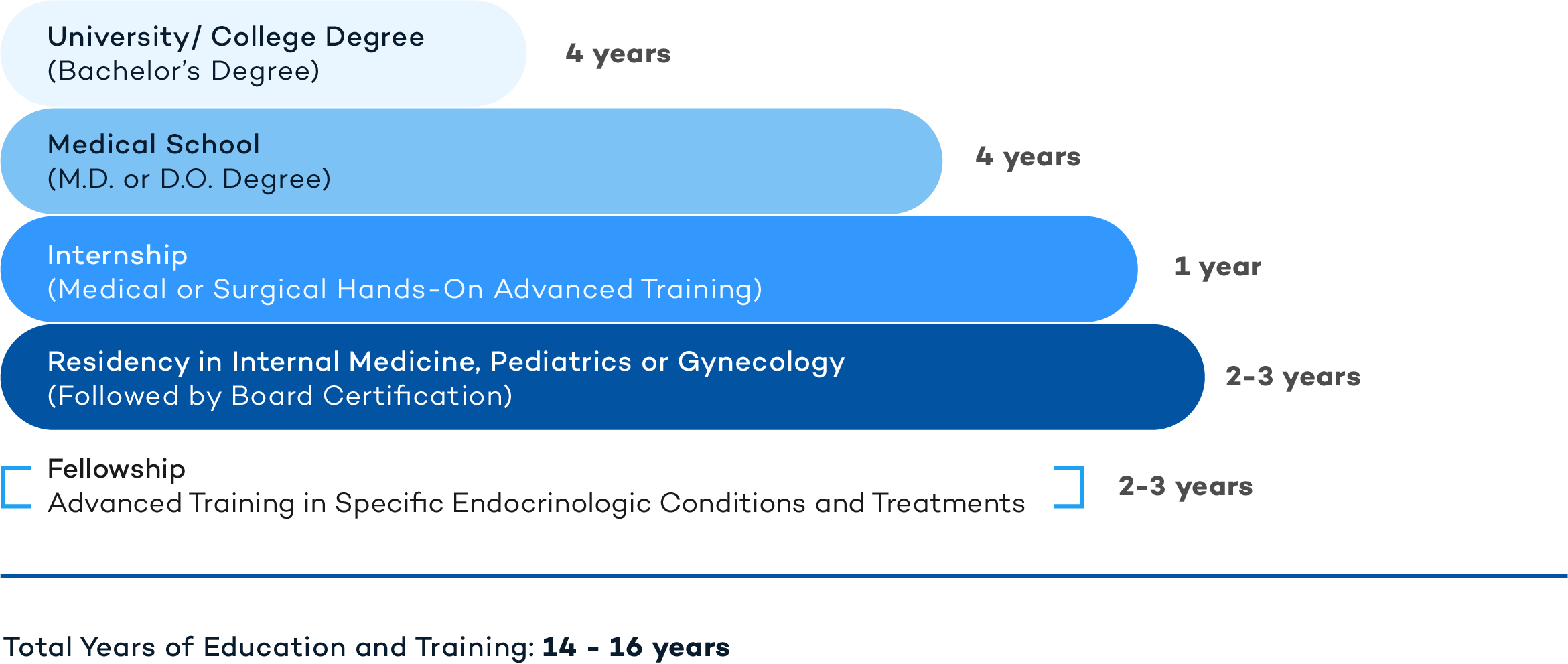

An Endocrinologist is a Board-Certified Doctor who specializes in treating, diagnosing, and managing disorders of the endocrine system, focusing on: hormones, glands, and complex biochemical processes within the body which promote growth. Endocrinologists specialize in the process of human metabolism, including all the biochemical reactions and physiologic processes during the growth of our body, as well as during the conversion of food into energy. These specialists treat conditions affecting hormone production by the pancreas (diabetes), the thyroid gland, the pituitary gland, and the gonads (name for female and male organs, where sex hormones are made). Endocrinologists work with patients of all ages, including the very young (Pediatric Endocrinologist).
Typically, your Primary Care Doctor (Family Medicine, Internal Medicine, Pediatrics, or OB/GYN) will be the doctor establishing a preliminary endocrine diagnosis, based on your symptoms and lab results. They will recommend an Endocrinologist that they trust and who will perform further specialized work-up of your condition. At myDoqter, we facilitate this process by providing you with access to patient feedback about doctors, as well as to the professional recommendations given by other physicians who have witnessed first-hand the expertise and professional competency of your Endocrinologist.
Endocrinologists are physicians (M.D. or D.O.) with advanced medical degrees and training. The following is a representation of the years of education and training that an Endocrinologist has undergone.

ENDO from the Greek word ‘endo’ for ‘within’ and CRINO from the Greek word ‘krine’ for ‘separate/secrete’ + LOGY from the Greek word ‘logia’ which means ‘logic’ or ‘the study of’.
An Endocrinologist will treat an extensive list of conditions related to your endocrine system, including:
Diabetes: This is a condition in which your body does not adequately process blood glucose (sugar). Diabetes can lead to a buildup of glucose in the blood, which can in turn lead to long-term harmful effects on various organs of the body. Over time, a number of serious complications can develop from diabetes, such as: stroke, heart disease, visual problems and loss of sight, nerve damage and kidney disease. Diabetes is the seventh leading cause of death in the United States and affects more than 30 million people over the age of 18 in the United States. Diabetes is a serious, often lifelong condition, that must be carefully managed to avoid significant co-morbidities (accompanying complications). There are three types of diabetes: Type 1 (juvenile type), Type 2 (acquired, also known as adult type), and gestational diabetes (occurring during pregnancy). Treatment options for diabetes depends on the type. Type 1 Diabetes is characterized by a deficiency or lack of insulin production by the pancreas gland. It is hereditary, and begins in childhood. Type 1 diabetes, therefore, requires insulin injections to be able to effectively control blood sugar levels. Type 2 diabetes is the most common form, in which the body makes normal amounts of insulin, but the tissues do not respond to the insulin and, as a result, blood sugar levels remain high, such as after a meal, for example. This type of diabetes is called insulin-resistance or adult type diabetes. It is often linked with obesity. Lastly, gestational diabetes occurs when the body becomes less sensitive to insulin during pregnancy. This form usually resolves after giving birth.
Obesity: Being obese means that you have an excess amount of body fat. Obesity can lead to potentially fatal conditions, such as stroke, high blood pressure, cardiovascular disease, diabetes, and cancer. Obesity occurs when a person’s body mass index (BMI) is 30 or greater. In some cases of obesity, there may be hormonal imbalances that, when addressed by the Endocrinologist, can help lose excess weight and achieve a healthier lifestyle.
Hypothyroidism: This is a condition in which the thyroid gland fails to produce sufficient thyroid hormone. The thyroid produces hormones that regulate important bodily functions, such as body temperature. A lack of thyroid hormone slows down this system. Symptoms of hypothyroidism may include fatigue, decreased sweating, hair loss, cold intolerance, coarse skin and delayed puberty. Symptoms of hypothyroidism may not be recognized early on and can lead to serious health issues such as obesity, infertility, heart disease and joint pain. Treatment of this condition often includes thyroid replacement medication for life.
Hyperthyroidism: This is a condition in which the thyroid produces too much thyroid hormone (overactive thyroid). This condition increases the metabolism of the patient. Symptoms of hyperthyroidism may include unexpected weight loss, rapid or irregular heartbeat, and sweating. There are several treatments available to treat this condition including medications, radioactive iodine or even surgery.
Thyroid Nodules: Nodular disease of the thyroid is quite common and presents with one or more solid or fluid-filled lumps in the base of the neck. The vast majority of these growths are noncancerous and don’t produce symptoms. Many of these growths are discovered incidentally during a physical exam. An Endocrinologist can determine if a diagnostic workup is necessary for any of these types of growths.
Thyroid Cancer: Cancer of the thyroid is usually caused by a combination of genetic and environmental factors. The thyroid produces hormones that regulate body temperature, weight, blood pressure, and heart rate. Patients with thyroid cancer may notice a lump in the throat or may experience hoarseness, throat or neck pain, difficulty swallowing or a persistent cough. These tumors are usually confirmed with a fine-needle aspiration biopsy and by ultrasound to assess the tumor and any associated cervical lymph nodes prior to surgery.
Growth Hormone Deficiency: This deficiency occurs most commonly in children and is the result of inadequate secretion of growth hormone by the anterior pituitary gland. Symptoms of growth hormone deficiency may include anxiety, fatigue, and decreased muscle mass and strength. This hormone deficiency may also be seen in several genetic disorders including Prader-Willi Syndrome and Turner Syndrome. Growth hormone deficiency causes children to be shorter and have increased fat around their abdomen. If this deficiency develops later in childhood, then it is associated with delayed puberty.
Acromegaly: This is a hormonal disorder where your pituitary gland produces an excessive amount of growth hormone. This increased release of growth hormone causes bones to increase in size, especially on the hands, feet, and face. Acromegaly usually affects middle-aged adults but it can develop at any age. Other symptoms of acromegaly may include coarsened facial features and thickened skin, muscle weakness, excessive sweating and body odor, headaches, pain and limited joint mobility. Acromegaly may cause such gradual changes that it isn’t recognized until many years after onset. Systemic symptoms associated with acromegaly may include hypertension, diabetes, osteoarthritis, cardiovascular disease and sleep apnea.
Pituitary Tumors: The pituitary gland, located at the base of the brain, controls many other glands located within the body. The majority of pituitary tumors are non-cancerous (benign), and most are hormone-producing tumors are called adenomas. While most tumors produce an increased amount of hormones, some may cause your pituitary gland to produce lower levels of hormones. Symptoms of a pituitary tumor may include headaches, visual changes, a sudden change in mood, and irritability. Treatment for these tumors may include surgical resection, controlling the growth, or using medications to manage the adversely affected hormone levels.
Osteoporosis: This is a condition in which the quality and density of the bones are reduced and the structure of the bones becomes fragile and porous. These changes happen over time and are worse in the elderly. Osteoporosis is the most common metabolic bone disease. Although osteoporosis affects both men and women, postmenopausal women have the highest incidence rates. Osteoporosis is worsened by the chronic lack of physical activity, in particular by the lack of low-level weight-bearing exercises. Patients with this condition are at an increased risk of fracture. Symptoms of osteoporosis may include loss of height over time, a stooped posture, and back pain. There is no cure for osteoporosis but treatments with oral or injectable bisphosphonate medications can help slow the breakdown of bone.
Your Endocrinologist will provide you with all the essential information regarding hormone-related disorders, as well as how to promote your overall health. If diagnosed with an endocrine abnormality, an Endocrinologist will offer you a range of treatment options for your specific condition and will work with you to find the best personalized approach to manage this most effectively. Please make sure to discuss all of these options and any other preventive recommendations to boost your health with your physician, including:
Finding the right physician is an important first step to get the right treatment. Endocrinologists are trained to offer a wide range of treatment options that are tailored to your specific condition. Personalized plans will help you to manage your endocrine system disorder.
You can read more about Endocrinology in the following links:
https://www.hormone.org/what-is-endocrinology/the-endocrine-system
https://www.hormone.org/diseases-and-conditions
https://medlineplus.gov/endocrinesystem.html
https://www.epa.gov/endocrine-disruption/what-endocrine-system#chemicals
https://www.epa.gov/endocrine-disruption/what-endocrine-disruption